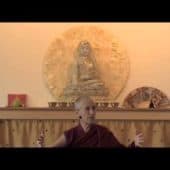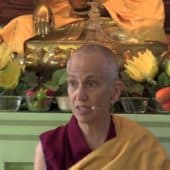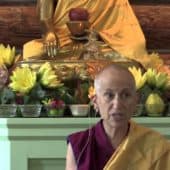Don't Believe Everything You Think (2013-16)
Teachings on Don’t Believe Everything You Think given at Sravasti Abbey’s monthly Sharing the Dharma Day. The book is a commentary on "The 37 Practices of Bodhisattvas" by Gyelsay Togmay Zangpo.

Transforming suffering
Looking at our reactions when we face adversity, and how we can transform pain and suffering into the path by means of the taking and…
View Post
Facing blame
Recognizing attachment to reputation and examining the mind's reaction when it is threatened.
View Post
Working with criticism
How to see those who criticize us and challenge us as teachers who point out our faults in order to help us improve.
View Post
Squashing our ego
If we have confidence in our good qualities, it will not matter what others say about us. We can own up to our mistakes without…
View Post
Ending the pity party
How to work with the mind that wants to wallow in self-pity. We can use taking and giving meditation to feel connected to others in…
View Post
Don’t let success go to your head
Examining how real happiness is found inside, not outside in any form of wealth or success.
View Post
Working with anger
Examining how the source of our anger is our own mind, and that we have the potential to be free of anger and have a…
View Post
The misery of attachment
Investigating the affliction of attachment and how it leads to dissatisfaction and dukkha. Changing our perspective can decrease attachment.
View Post
Chasing rainbows
What actually is chocolate? When we look closely at the objects we are attached to we can't actually find what they are. They are like…
View Post
Suffering is like a dream
Looking at things and people in a more realistic way can help us have a different response and reduce the dukkha experienced.
View Post
